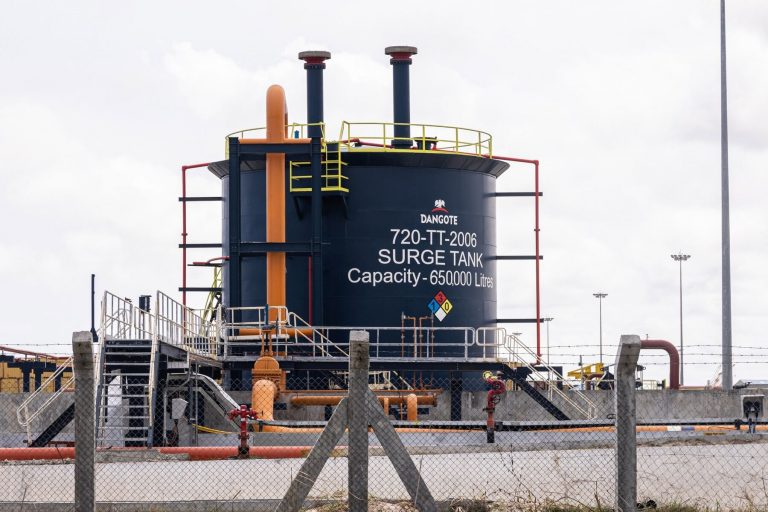
The Dangote Refinery, located in Lagos, has started processing premium motor spirit (PMS), commonly known as petrol, as Nigeria braces for the rollout of its first locally refined fuel.
According to a report from Reuters on Monday, the Nigerian National Petroleum Company (NNPC) Limited will become the exclusive buyer of this petrol, marking a critical step in addressing the nation’s long-standing fuel shortages.
This development comes as the NNPC grapples with significant supply challenges, including debts owed to international oil traders, which have contributed to the recent fuel scarcity. However, while the new arrangement with Dangote Refinery offers hope for improved supply, concerns linger over the expected cost of the product and its affordability.
Tekedia Mini-MBA edition 16 (Feb 10 – May 3, 2025) opens registrations; register today for early bird discounts.
Tekedia AI in Business Masterclass opens registrations here.
Join Tekedia Capital Syndicate and invest in Africa’s finest startups here.
The 650,000 barrel-per-day petrochemical plant has begun testing its petrol production and is expected to release the product into the market in the coming weeks, according to the report. Vice President at Dangote Industries Limited, Devakumar Edwin, confirmed that the refinery is ready to supply petrol to the NNPC, which will purchase the entire output for domestic distribution.
“We are testing the product (gasoline), and subsequently, it will start flowing into the product tanks,” Edwin said. “If no one is buying it, we will export it as we have been exporting our aviation jet fuel and diesel.”
While Edwin did not specify an exact date for when the petrol would hit the Nigerian market, the refinery’s capacity to process large quantities of fuel is seen as a game-changer for the country’s embattled energy sector. Yet, the looming price issue casts a shadow over the optimism surrounding this new supply source.
NNPC’s Debt Crisis and Supply Woes
This new arrangement could not have come at a better time for NNPC, which has struggled to maintain a steady fuel supply due to mounting debts. The national oil company has recently acknowledged owing international oil traders around $6 billion in subsidy obligations. This debt has caused these traders to halt the supply of imported petrol, exacerbating the fuel shortages in Nigeria.
Despite initially denying these claims, NNPC was forced to admit that its outstanding debts had directly contributed to the disruptions in fuel supply.
In a statement, the company acknowledged the severity of the situation: “NNPC Ltd. has acknowledged recent reports in national newspapers regarding the company’s significant debt to petrol suppliers. This financial strain has placed considerable pressure on the Company and poses a threat to the sustainability of fuel supply.”
However, the NNPC reaffirmed its commitment to ensuring national energy security. It further stated: “In line with the Petroleum Industry Act (PIA), NNPC Ltd. remains dedicated to its role as the supplier of last resort, ensuring national energy security. We are actively collaborating with relevant government agencies and other stakeholders to maintain a consistent supply of petroleum products nationwide.”
The Price Concerns
While the partnership between Dangote Refinery and NNPC holds promise, the potential cost of the locally refined petrol is raising concerns. Some industry experts suggest that the price per liter could reach N1,000, a figure that would strain household budgets across the country. As fuel prices have already surged due to the removal of the government subsidy last year, the anticipated cost of the new petrol could lead to further inflationary pressures, particularly in the transport and logistics sectors.
Analysts say this anticipated cost underscores the complex trade-offs of Nigeria’s energy policies. On the one hand, domestic production of petrol reduces reliance on costly imports and long supply chains, potentially lowering logistics and importation costs for NNPC. On the other hand, without a subsidy to cushion the blow, consumers may find themselves paying more for fuel than ever before, especially as the refinery seeks to operate profitably in a deregulated market.
What This Means for Nigeria’s Energy Sector
NNPC becoming the exclusive buyer of Dangote Refinery’s petrol is expected to alleviate some of the company’s supply issues. By sourcing locally, NNPC would reduce its reliance on international traders, potentially lowering its import bill and stabilizing fuel availability. The collaboration with Dangote Refinery is also expected to cut down on logistics costs, making it easier for local marketers to access the petrol.
However, analysts believe that if the high cost of Dangote’s petrol does materialize, it could offset some of the benefits of local production, leading to continued discontent among consumers already grappling with high living costs.
The Federal Executive Council has recently approved the sale of crude oil to the Dangote Refinery in local currency, on the condition that the refinery will sell its refined petrol to the country in the same currency. This could offer some relief to the NNPC, allowing it to purchase refined products without the added pressure of foreign exchange fluctuations. Nevertheless, the impact on retail prices remains uncertain, with many Nigerians bracing for further price hikes.



